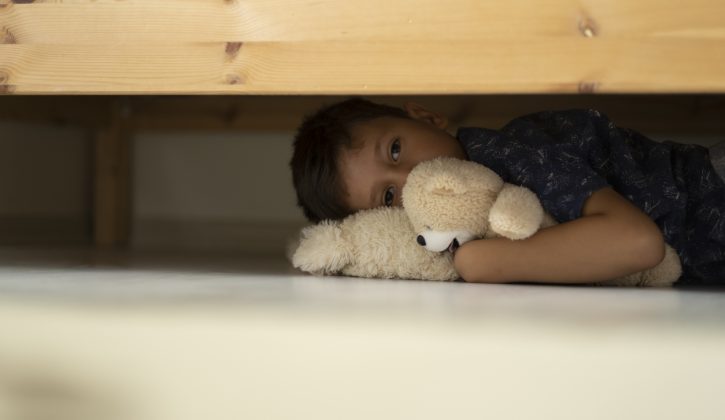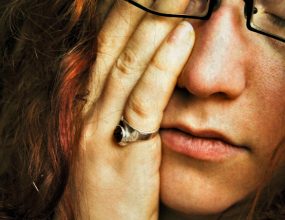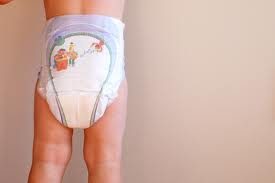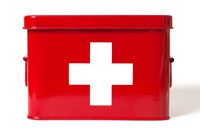Ahhh, Enuresis. Otherwise known as bedwetting. If I had a dollar for every time I had to strip the bed half-asleep in the middle of the night because of someone’s accident, I’d be filthy, filthy rich. There were stretches where I swear I was washing sheets every single night for weeks on end. It felt like my son would never stop wetting the bed.
I was so concerned that I even asked his pediatrician if I should be worried – and was shocked when she told me that most health care professionals didn’t consider it a problem requiring treatment until the child was around 11 or 12 years old!
Much to my relief, my son did eventually outgrow his bedwetting before we hit that age (and before my washing machine died out). While soggy sheets and pajamas – and an embarrassed child – are a familiar scene in many households, what exactly is considered normal when it comes to nighttime bladder control?
What is bedwetting?
Bedwetting is sometimes called nocturnal enuresis or nighttime incontinence. It is involuntary urination while asleep after the age at which staying dry at night can be reasonably expected.
The American Academy of Family Physicians doesn’t consider bedwetting to be problematic unless the child is over the age of five and still wets the bed two to three times per week. The Canadian Pediatric Society (CPS), on the other hand, is more vague with their timelines, and notes that most children will outgrow bedwetting on their own over time without the need for
treatment.
Unlike daytime toilet training, bedwetting has little to do with habits, and everything to do with your child’s development. In short, your child won’t stop wetting the bed until they are biologically ready. Biology has a lot to do with bedwetting, with the CPS noting that scientists have discovered a gene for bedwetting, and that a child with one parent who wet the bed when they were young is 25% more likely to wet the bed. That number increases to about 65% if both parents wet the bed as children. It also tends to be more common in boys, and children with ADHD.
When will my child stop wetting the bed?
The CPS states that by five years of age, 15% of children wet the bed. By eight, that number decreases to 6% to 8% of kids. Without treatment, about 2% of children still wet the bed by 15 years of age. If you’re frustrated by your child’s nighttime accidents, it’s important to remain calm and supportive. You should never punish or shame your child for bedwetting, as it’s not something they can control and it certainly won’t solve the problem. In fact, it might make bedwetting worse.
Some strategies that can help prevent bedwetting include:
- Limiting your child’s fluid intake before bedtime
- Avoiding caffeinated beverages
- Encourage your child to use the toilet at the start of their bedtime routine and again before getting into bed
- Use training pants rather than diapers
- Make sure your child has easy access to the bathroom at night. Install night lights if possible
- Use a high-quality mattress protector to protect your child’s mattress
- Create a reward system for dry nights. (Do not punish accidents)
Additional tips to help with bedwetting include:
- Making sure your child has a bath or shower in the morning to clean themselves and remove any smell of urine
- Ask your child to help you change the bed and wash laundry
- Don’t worry about waking your child to use the bathroom during the night. This doesn’t actually help prevent bedwetting and will only disrupt their sleep
When to see a doctor about bedwetting
While it’s true that most children outgrow bedwetting on their own, in some cases, bedwetting may be a sign of an underlying medical condition that needs investigation and treatment.
You should consult your child’s doctor if:
- Your child still wets the bed after the age of five or six
- Your child starts to wet the bed after being dry at night for several months
- They’re experiencing painful urination, unusual thirst, pink or red urine, hard stools, or snoring
- Your child is having daytime accidents
- Your child is concerned or upset by the bedwetting
What is the treatment for bedwetting?
The first treatment for bedwetting is behaviour therapy, which helps teach your child not to wet the bed. These are those strategies to prevent bedwetting mentioned above. You might also consider installing a moisture alarm that your child wears at night. It will wake them up when they start to pee and can help teach them when they have a full bladder.
(Ed. note: I found the bedwetting alarm cruel and jarring and no different in theory than waking them in the night.)
Medication
If these things prove unsuccessful after several months, your doctor may recommend medication to treat your child’s bedwetting. Desmopressin acetate (or DDAVP) is a medication that has been used to treat bedwetting since the 1970s. It helps the body produce less urine, so your child doesn’t need to pee during the night. While it’s useful for special situations, such as sleepovers or camp, it’s not meant for daily use. And, like all medicines, it’s not without side effects, so it’s best to speak with your child’s doctor to determine if the benefits outweigh the risks.
At the end of the day, medicines are not a cure for bedwetting, and it may simply take several months, or even years, before your child stays dry overnight when they’re developmentally able to.
Alternative Bedwetting Treatments
There are plenty of alternative treatments and therapies to treat bedwetting, and anecdotal evidence that they work. A friend tried hypnotherapy for her 12-year-old daughter who’d tried everything. Within three days of the session, she stopped wetting the bed completely. The therapist also pointed out that she could hold her pee since she didn’t wet during the day. It was almost as though that simple observation helped to clear the mental block the enuresis created.
Other alternative bedwetting therapies include acupuncture, chiropractic therapy, and herbal therapy. While there is no definitive proof that any of these things work, so long you approach them with an open mind and without high expectations. Any herbs or supplements should be cleared by a doctor to ensure there are no conflicts with any existing medications.
Tagged under: bedwetting,wetting the bed,nocturnal enuresis,wet the bed,enuresis
Category: child-care,mom-101,health






